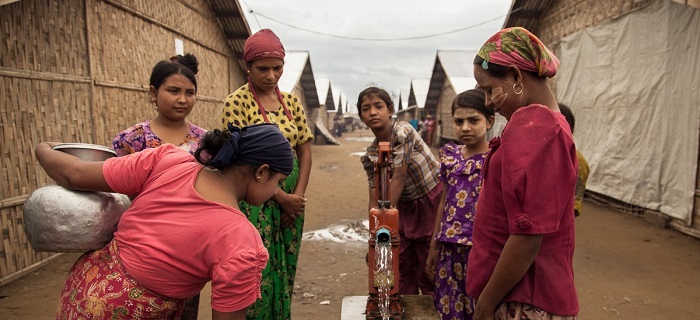Rohingyas face an apathetic welcome from Southeast Asian countries
By Roshni Kapur
The desperate plight of boatloads of Rohingya Muslims stranded at the Andaman Sea has caused international alarm. As many as 6,000 migrants from Bangladesh and Myanmar are on overcrowded and rickety boats off the coasts of Thailand, Malaysia and Indonesia. Known as the “boat people”, their food and water supplies are dwindling and they have been have been prevented from making port in Southeast Asia.
The Thai navy has provided food supplies to migrant boats near its territory and will temporarily allow refugee camps on its shores. But it does not want them to permanently settle there. “If they break the law and land in Thailand, how can we take care of them?” Thai Prime Minister Prayuth Chan-ocha told reporters on Thursday. “Where will the budget come from? That money will need to come from Thai people’s taxes, right?”
For Indonesia and Malaysia, both predominantly Muslim countries, the issue is less clear-cut. An estimated 800 migrants were brought ashore to Kuala Langsa Port in Aceh province, Indonesia on Friday. However, other crammed boats may not be taken in. Indonesia’s military chief General Moeldoko was quoted by Reuters “we will try to prevent them from entering our territory, otherwise it will create social issues. If we open up access, there will be an exodus here.”
While Malaysia is the choice of destination for the stranded migrants, the government has ordered its navy to stop them from entering. “What do you expect us to do?” Malaysian Deputy Home Minister Wan Junaidi Jafaar was quoted by The Guardian. “We have been very nice to the people who broke into our border. We have treated them humanely, but they cannot be flooding our shores like this.”
The hardline stance by Southeast Asian countries has exposed underlying religious and ethnic prejudices. Many also fear being swamped by an influx of migrants. Lex Rieffel, an expert on Southeast Asia at the Brookings Institution said that Thailand has been battling an Islamist insurgency in its south for decades and has “no stomach” for bringing in more Muslims.
Who are Rohingya Muslims?
The estimated 1.3 million Rohingyas are a distinct Muslim ethnic group living in Myanmar’s Western Rakhine state. Rohingya Muslims practice a blend of Sunni and Sufi Islam where many also live in Bangladesh, Saudi Arabia and Pakistan. In Bangladesh about 200,000 Rohingyas are living in refugee camps on the south-eastern border. Some have been sent back to Myanmar.
In Buddhist-majority Myanmar, Rohingyas have been systematically discriminated by successive governments who have introduced policies to repress them and deny citizenship rights. The government argues that Rohingyas are not a Burmese ethnic group but Bengali migrants who belong to Bangladesh. Rohingyas have been subjected to forced labour and their movements are heavily restricted. The government recently revoked white cards – or temporary registration certificates – that were initially issued to thousands of Rohingyas. This will disenfranchise them from voting in the upcoming General Elections in November.
In June and October 2012 there were violent clashes between the Buddhist community and Rohingya Muslims in Rakhine. The sectarian violence left hundreds dead and more than 140,000 were pushed to displacement camps. Since then, more than 100,000 have fled by boat to escape violence and further persecution. The UN refugee agency published a report in March 2015, revealing that 25,000 migrants had left Myanmar and Bangladesh in the first quarter of 2015. Between 40-60% of the 25,000 are believed to originate from Rakhine.
Aid agencies claim that countries where refugees are in their territorial waters have a moral imperative to provide food and water supplies for them. Although these countries have made efforts to provide supplies, none of them has actively engaged in search-and-rescue operations in waters beyond their coastlines.
Many migrants are still adrift at sea. Despite the risks of being held hostage by smugglers and human traffickers, more Rohingyas are fleeing from Rakhine. The Rohingya exodus can only be stopped if the regional community puts pressure on Myanmar. The failure of South-East Asian countries to act decisively on the humanitarian crisis is evident. Officials have quietly ignored addressing the issue at regional conferences to avoid upsetting Myanmar. Rieffel says that ASEAN is unlikely to do anything about the crisis. ASEAN is “not a regional body and it doesn’t have a budget or a mechanism for dealing with this situation.”

